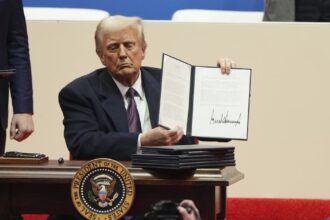As global economic leaders converge in Italy this week, the shadow of Donald Trump’s promised tariff regime and the ongoing financial strain of supporting Ukraine have dominated discussions among G7 finance ministers and central bank governors. The meeting in Stresa marks a critical moment for international economic cooperation amid mounting uncertainties.
“We’re navigating uncharted waters,” remarked Canadian Finance Minister Chrystia Freeland during opening statements. “The potential for widespread tariffs threatens to undermine decades of trade liberalization that has powered global prosperity.”
Trump’s campaign pledge to implement sweeping tariffs of 10% on imports from allies and up to 60% on Chinese goods has sent tremors through financial markets and policy circles. European officials have been particularly vocal about the destabilizing effects such measures could have on the delicate post-pandemic economic recovery.
Meanwhile, Ukraine’s financial needs continue to grow as the war with Russia extends into its third year. Ukrainian Finance Minister Serhiy Marchenko presented a sobering assessment of his country’s fiscal situation, emphasizing that without continued G7 support, essential government services could face collapse by year’s end.
The World News implications are substantial, as G7 nations collectively represent over 30% of global economic output. Their decisions on trade policy and financial support for Ukraine will reverberate far beyond their borders.
Japanese Finance Minister Shunichi Suzuki stressed that “any return to protectionism would threaten global supply chains that have only recently begun to stabilize.” This sentiment was echoed by his counterparts from France and Germany, who called for maintaining the rules-based international trading system that has underpinned global commerce for decades.
The Italian hosts have attempted to strike a balanced approach, acknowledging legitimate concerns about Business competitiveness while warning against measures that could trigger retaliatory tariffs and a potential trade war.
Behind closed doors, finance officials have been exploring mechanisms to ensure Ukraine’s financial stability without further straining their own fiscal positions. Options include leveraging frozen Russian assets, coordinating loan guarantees, and streamlining aid delivery systems to maximize impact.
“The costs of supporting Ukraine pale in comparison to the costs of allowing Russian aggression to succeed,” noted U.S. Treasury Secretary Janet Yellen, whose remarks underscored the geopolitical stakes beyond mere budgetary considerations.
The Politics of these financial decisions cannot be overlooked. Public support for continued Ukraine funding has shown signs of fatigue in several G7 nations, particularly as domestic economic concerns take precedence for many voters.
Italian Finance Minister Giancarlo Giorgetti emphasized that finding common ground remains possible despite differences: “Even with varying domestic pressures, we share fundamental values about economic stability and international security that transcend political divisions.”
The discussions have revealed a growing recognition that global economic governance needs updating to address 21st-century challenges, including digital currencies, climate finance, and more equitable development models. However, the immediate concerns of potential trade disruptions and Ukraine’s funding needs have dominated the agenda.
As the finance ministers prepare their communiqué, observers will be watching closely for signals about how the world’s most advanced economies plan to navigate these troubled waters. Will they find a path that balances legitimate concerns about fair trade while avoiding a destructive cycle of protectionism and retaliation that could harm Canada News and global markets alike?

























